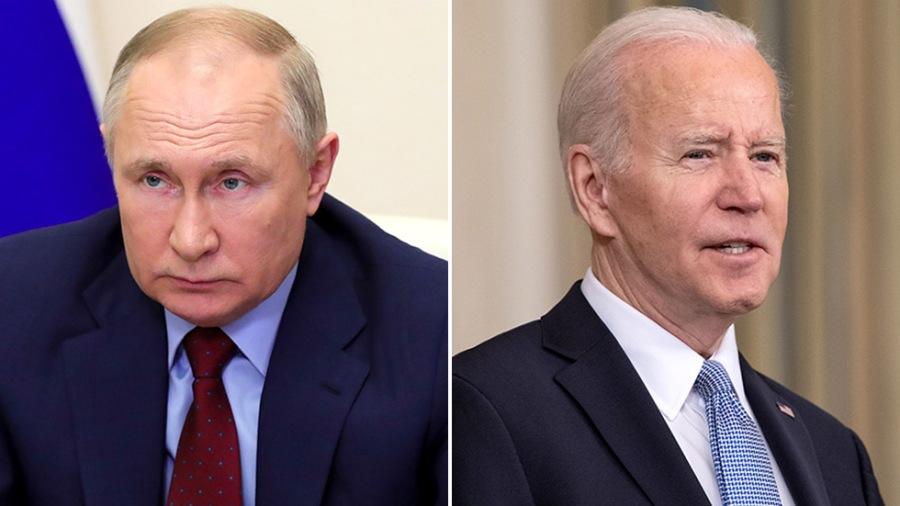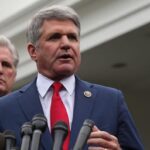
The Biden administration on Wednesday announced a sweeping new wave of sanctions targeting the closest members of Russian President Vladimir Putin’s inner circle, two of his daughters and top Russian financial institutions.
The administration said the sanctions are a direct response to horrors uncovered in Ukrainian cities and towns outside Kyiv following the Russian retreat. Hundreds of civilians are believed to have been intentionally killed while under Russian occupation.
“There’s nothing less happening than major war crimes,” President Biden said in a speech on Wednesday, calling for “responsible nations” to hold the perpetrators accountable.
“Together, with our allies and our partners, we’re going to keep raising the economic cost and ratchet up the pain for Putin and further increase Russia’s economic isolation.”
Here are five things to know about the latest sanctions:
1) Sanctions target Putin’s daughters
U.S. sanctions against Putin escalated on Wednesday with new measures naming two of his adult children.
The sanctions, which block any property or assets held by the blacklisted individual in the U.S. and generally prohibit Americans from conducting financial transactions with the sanctioned individual, target Katerina Vladimirovna Tikhonova and Maria Vladimirovna Vorontsova.
The two women were sanctioned as part of a broader U.S. strategy to “expose Russia’s kleptocracy,” a senior administration official said Wednesday.
Tikhonova is described by the U.S. as a tech executive whose work supports the Russian government and defense industry, and Vorontsova is said to lead state-funded programs that “received billions of dollars from the Kremlin toward genetics research and are personally overseen by Putin.”
Thomas Pickering, who served as ambassador to Russia among various senior positions across four decades in the State Department, said the move is a “small gesture” but added that it’s “clear that it’s oriented at Putin personally.”
Pickering said he expects Putin to be “unflinching” in the face of the new measures. The U.S. had already imposed sanctions specifically against the Russian leader.
“I suspect … he will be firm and unflinching and not in any way, at all, wish to show any sign that this is impacting him in a personal way, both not to invite more of the same and, secondly, to uphold his concept of himself as a kind of invincible, stalwart, hard-nosed, judo-playing leader,” Pickering said.
2) U.S. blacklists Putin’s top associates and family of foreign minister
Other sanctions targeted Russian Foreign Minister Sergey Lavrov’s wife, Maria Aleksandrovna Lavrova, and their daughter, Yekaterina Sergeyevna Vinokurova.
Lavrov was sanctioned by the U.S. at the same time as Putin on Feb. 25.
Also sanctioned by the U.S. are 21 members of Russia’s Security Council, bringing all of the council members under sanctions by either the U.S. or its allies, including sanctions that had earlier been imposed by Canada, the European Union (EU), Japan, New Zealand, Australia and the United Kingdom.
The U.S. had earlier sanctioned 140 oligarchs and their family members as well as more than 400 Russian government officials.
The senior administration official called the sanctioned individuals “the key architects of the war” and said the sanctions strategy is to “show that Putin and his cronies have been ripping off the Russian people for decades.”
Pickering said it’s unclear how much the personal sanctions on individuals signal an escalation by the U.S., but added that “the idea for the targeted sanctions is always to send a message to a senior leader and, in one way or another, do what you can to make things awkward for that leader.”
3) Russian energy and gas delivery largely allowed, for now
Perhaps most crucial to exacting a devastating cost are efforts by the U.S. and its allies to cut off Russian oil and gas exports, which make up about 40 percent of Russia’s budget revenue.
While the administration announced expanded sanctions on two of Russia’s largest banks, Sberbank and Alfa, it allowed for key carveouts to allow financial transactions for Russian oil and gas exports, withholding some of the most damaging measures to Russia’s economy but preserving energy for allies in Europe.
The financial carveouts allow foreign countries to pay for Russian exports in their local currency, but Russia is able to use that revenue only after it’s been transferred into rubles, somewhat weakening its impact.
“Why is energy left out? Best guess: The US is waiting on the E.U., and [the] E.U. is waiting on Germany,” tweeted Edward Fishman, adjunct senior fellow at the Center for a New American Security.
German Finance Minister Christian Lindner said Germany could not afford to block Russian gas in the short term.
“We would inflict more damage on ourselves than on them,” he said, according to Reuters.
Fishman said Russia is able to “rake in $1 billion each day” over continued oil and gas sales.
The U.S. has blocked imports of Russian oil and gas, and the United Kingdom (U.K.) on Wednesday said it would work to end dependence on Russian coal and oil by the end of 2022 and end imports of gas soon after.
Charles Michel, president of the European Council, on Wednesday proposed a new sanctions package that would immediately ban Russian coal and said a ban on “oil, and even gas, will also be needed sooner or later.”
Lithuania on Sunday became the first EU country to announce a ban on Russian gas imports, and Latvia, its Baltic neighbor, is expected to make a similar announcement shortly.
Yet a united EU sanctions package must have consensus from the bloc’s 27 members. Hungarian President Viktor Orbán, a key Putin supporter, has already said Budapest would not join in on a ban of Russian energy imports.
4) Hungary, India and China are wild cards in enforcing sanctions
Orban’s promise to continue paying for Russian gas widens other gaps the U.S. has failed to plug in its goal of a unified global financial pressure campaign against Russia.
India has held off joining U.S. sanctions or even bluntly condemning Moscow’s invasion to maintain its key ties with Russia, and that includes New Delhi importing Russian coal and oil.
The senior administration official called India a “friend” and “partner” but said there have been extensive discussions about Russia’s invasion. “We remain hopeful that we can have alignment to the maximum extent possible.”
China, meanwhile, is a top importer of Russian crude oil and imports significant amounts of Russian gas and coal, according to Reuters.
While Beijing has scoffed at Washington’s isolation campaign against Moscow, it has held back from fully aligning itself with the Kremlin. Reuters reported that while Beijing is honoring existing energy contracts with Russia, it has avoided signing new deals.
The senior administration official said Washington has had a series of private consultations “going up to the highest level of our government and China’s government” and that the U.S. has been “really clear [with Beijing] about the consequences of any efforts to circumvent or backfill those sanctions.”
5) U.S. says Russian bank sanctions triggering “Soviet-style” living standards
The administration, along with the U.K., took an extra step Wednesday by blocking new investment in Russia, part of a broader strategy to drain the Russian economy of new revenue and access to the newest technologies and know-how in the rapidly changing world.
“The reality is the country is descending into economic and financial and technological isolation and at this rate, it will go back to Soviet-style living standards from the 1980s,” the senior administration official said.
Still, Putin is likely able to hold on.
Benjamin Schmitt, postdoctoral research fellow at Harvard University and senior fellow at the Center for European Policy Analysis, said the sanctions announced on the Russian banking sector are a “significant next step in increasing pressure on the Putin regime to relent” in the war in Ukraine but that they “leave significant wiggle room to facilitate energy transactions.”
“Given the significant role that oil and gas plays in funding Putin’s horrific war machine, it is vital that the international community take steps to stop this flow of money as soon as possible,” he wrote in an email to The Hill.
For the latest news, weather, sports, and streaming video, head to The Hill.




